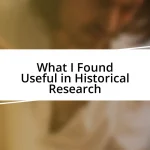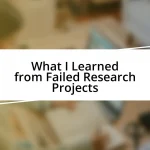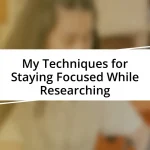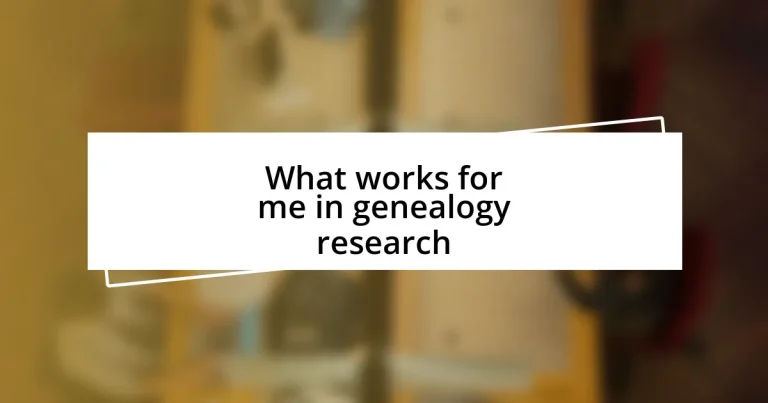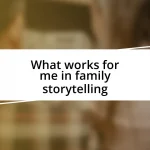Key takeaways:
- Establishing a clear research roadmap and utilizing organized tools like genealogy software enhances the effectiveness of genealogy projects.
- Connecting with family members and collaborating with researchers can unveil unexpected insights and foster a sense of community.
- Adopting flexible expectations and continuing education through workshops and resources helps navigate challenges and expand research horizons.
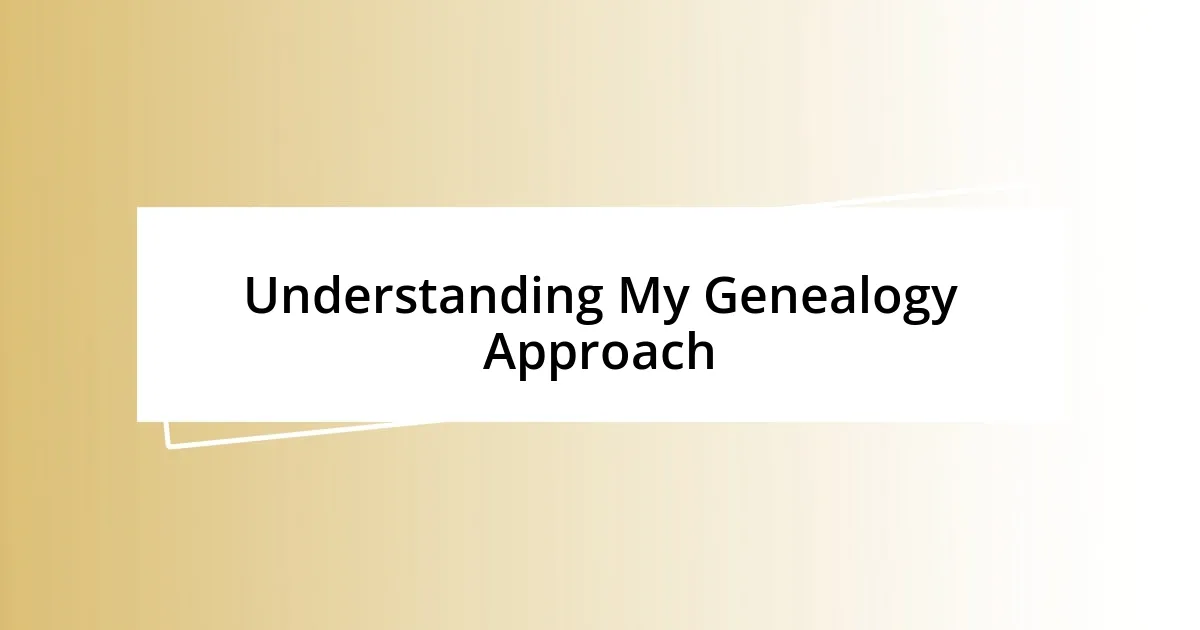
Understanding My Genealogy Approach
When I embark on a new genealogy project, I always start with a clear roadmap. For me, this often includes a well-organized family tree and detailed notes on what I already know. Have you ever felt overwhelmed by the sheer volume of information? I’ve been there, and creating this framework brings a sense of clarity that allows me to navigate the research process with purpose.
I find that connecting with family members is one of the most rewarding aspects of my genealogy approach. I vividly recall a conversation with my grandmother, where she shared stories from her childhood that weren’t in any family record. These personal anecdotes not only enrich my research but also remind me of the emotional ties that bind us together. Isn’t it fascinating how a simple chat can unveil hidden layers of our ancestors’ lives?
Another key element of my approach is utilizing both online resources and physical archives. I’ve learned that while digital platforms are incredibly handy, nothing beats the thrill of finding an old document in a dusty record office. It makes me wonder—what stories have been waiting for someone like me to uncover them? Each discovery feels like a treasure hunt, filled with excitement and anticipation.
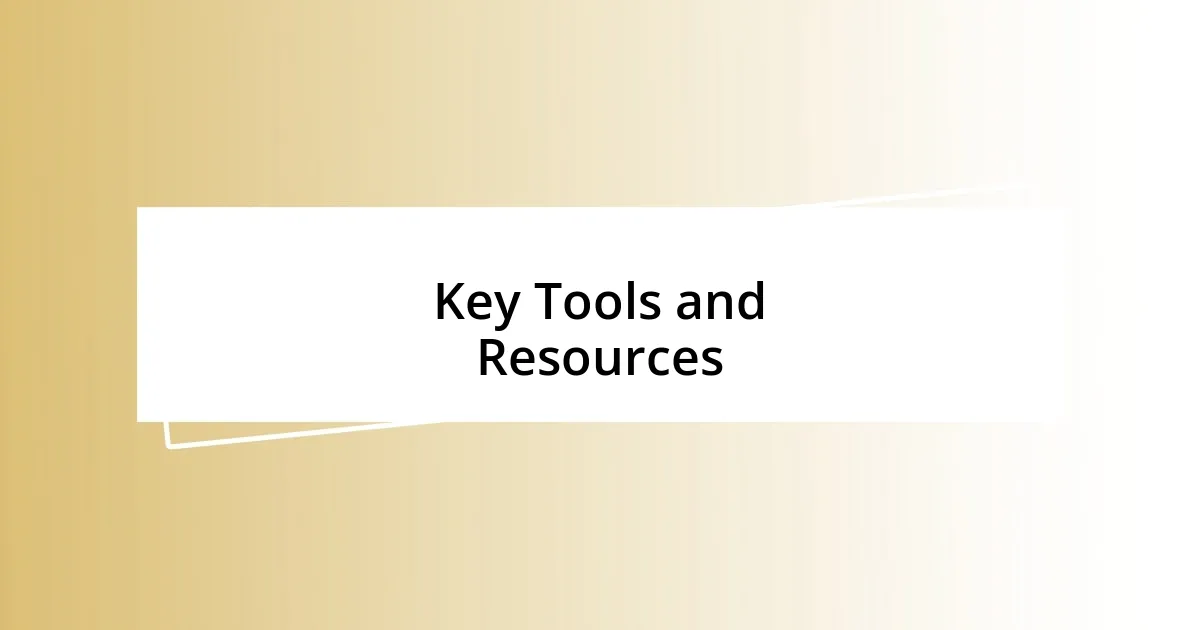
Key Tools and Resources
The tools and resources I rely on for genealogy research truly make all the difference. For instance, genealogy software like Family Tree Maker has been invaluable for organizing my findings; the ease of adding branches and connections creates a visual map of my family history. I can still recall the satisfaction of filling in that first few branches—it felt like bringing my ancestors back to life, if only in a small way.
Online databases such as Ancestry.com and MyHeritage are fantastic for accessing census records and military documents. I vividly remember when I stumbled upon a draft card for my great-grandfather—it seemed so mundane at first glance, yet it revealed details I never knew. Those little details—like his handwriting and signature—made the connection feel all the more real. Have you ever discovered an unexpected treasure in your research?
In addition to these digital resources, local libraries and historical societies often house unique collections that aren’t digitized. I once found an old newspaper clipping in my town’s archive that detailed a family reunion from the 1930s. It was a poignant moment, as I could almost hear the laughter and see the faces of relatives I never met. The combination of online tools and physical resources provides a more holistic view of my family’s history.
| Tool/Resource | Description |
|---|---|
| Genealogy Software | Helps organize findings and visualize family trees, e.g., Family Tree Maker. |
| Online Databases | Access to records such as Ancestry.com; useful for census and military records. |
| Local Archives | Unique collections not available online; includes newspapers, family records, etc. |
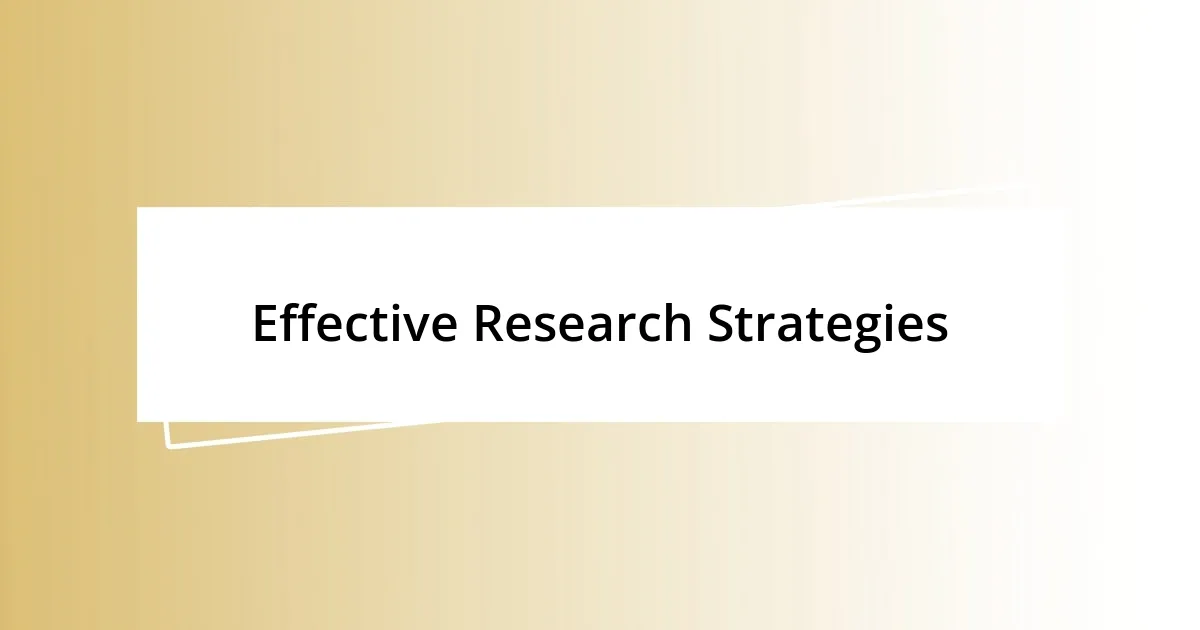
Effective Research Strategies
Effective research strategies are crucial for navigating the complex world of genealogy. One approach that has served me well is establishing a systematic plan before diving in. I’ve developed checklists that outline specific records I want to consult based on names, locations, and dates. It’s a surprisingly satisfying process to check items off after I find the information, almost like tangible victories along my research journey.
- Create a research checklist to track sources you want to consult.
- Designate specific time slots for focused research sessions to maintain productivity.
- Set manageable goals, such as finding one piece of information per session to avoid burnout.
In my research experience, collaboration has proven to be incredibly effective. By joining genealogy groups, I’ve met fellow enthusiasts who generously share tips and insights. I remember a particular discussion where a group member offered advice that led me to an overlooked county record office. The thrill I felt as I uncovered details about a distant relative felt like opening a time capsule, filled with the essence of history and family connection. This type of community support can often uncover pathways I hadn’t considered before.
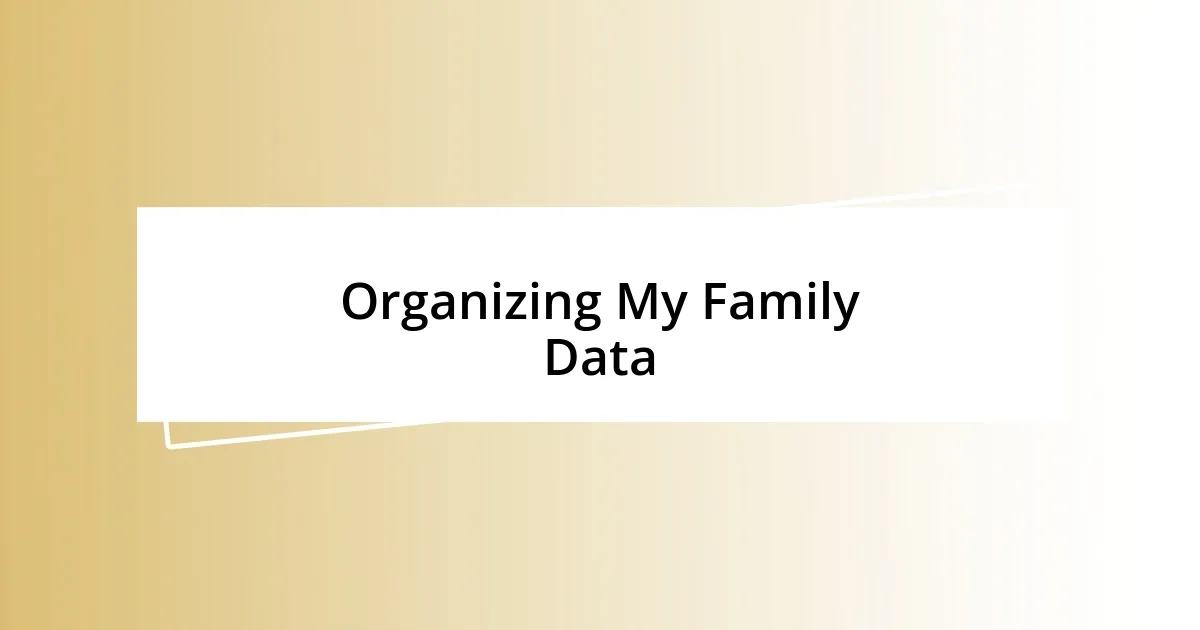
Organizing My Family Data
Organizing my family data isn’t just about keeping things tidy; it’s a vital part of uncovering the stories behind the names. I often find myself sorting through a maze of documents and photographs, and I realized early on that having a consistent filing system truly changed the game. For instance, I categorize records by type—census, marriage, and military—so that I can quickly retrieve what I need when new clues emerge. Have you ever spent hours searching for a document only to find it’s misplaced? Trust me, a simple organizing system can save you so much time and frustration.
One of my go-to methods for staying organized is utilizing colored folders. I assign a specific color to each branch of my family. When I open my file cabinet and see those vibrant colors, it gives me a sense of excitement and pride. Each folder is packed with stories waiting to be uncovered. The visceral thrill of flipping through those papers, knowing I’m piecing together my family’s tapestry, never gets old. It’s almost like each folder holds a small piece of my history, and I can’t help but smile thinking about the generations behind me.
I’ve also started creating digital backups of important documents to ensure nothing gets lost. After I accidentally spilled coffee on a priceless old letter from my great-aunt, I learned that lesson the hard way! Now, I scan everything and maintain a cloud storage system to keep my information secure and easily accessible. This not only protects my hard-earned research but also makes it easier to share with family members who might be as interested in our lineage as I am. Have you considered how preserving your family data can enhance connections with your family? It’s a rewarding investment in both time and emotional legacy.
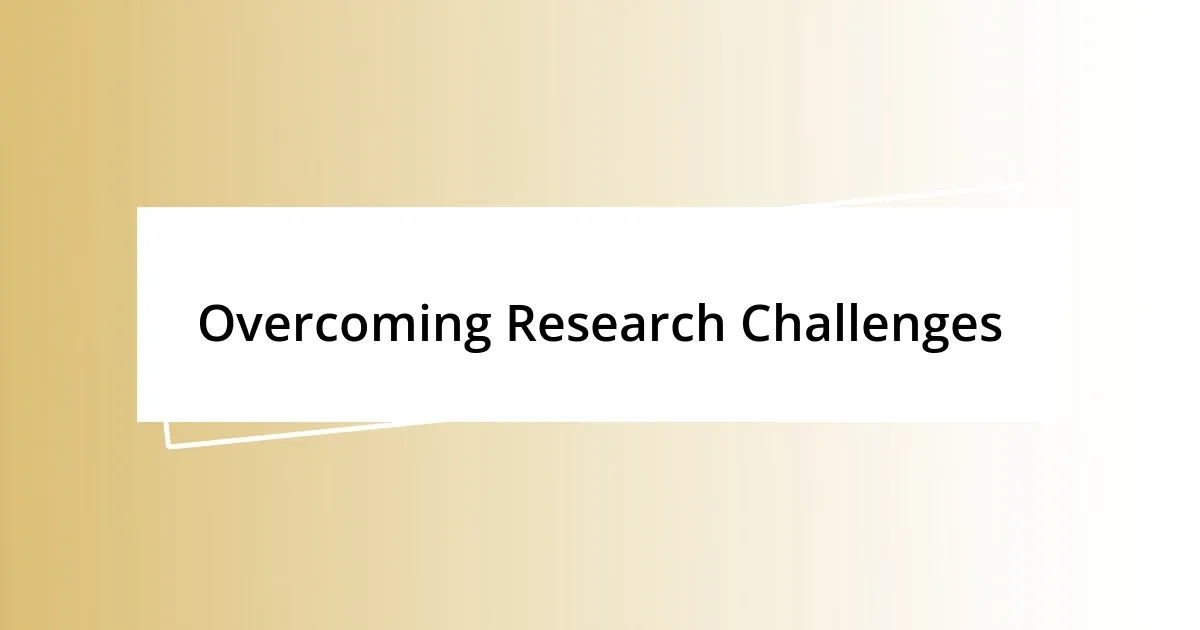
Overcoming Research Challenges
When it comes to overcoming research challenges, I’ve often found that persistence is key. There have been times when I’ve hit a wall—like when a crucial birth record just seemed to disappear. However, by revisiting my sources and approaching them from a new angle, I’ve managed to glean insights that initially eluded me. It’s a reminder that sometimes stepping back allows you to see things more clearly. Have you ever experienced that frustration? It often leads to some of the most rewarding discoveries.
Another strategy I’ve embraced is learning to be flexible with my expectations. I vividly recall a case where I was convinced that a certain ancestor hailed from a particular town, only to discover they had lived miles away! Instead of feeling defeated, I took it as an opportunity to expand my search parameters. I learned that staying open to unexpected outcomes not only enriched my family tree but allowed me to uncover branches of my lineage I never anticipated. I encourage you to try the same; you might be pleasantly surprised by where the journey takes you.
Networking with professionals proved invaluable during a particularly challenging phase of my research. I remember attending a genealogy conference and chatting with an expert who provided tips on accessing specialized databases. It felt like receiving a secret map to lost treasure. Connecting with those who share the same passion not only rekindles motivation but also awakens a myriad of resources. Have you tapped into local archives or engaged with researchers online? You’d be amazed at how others’ experiences can illuminate your own path, lighting up those shadowy corners of your ancestry you thought were forever hidden.
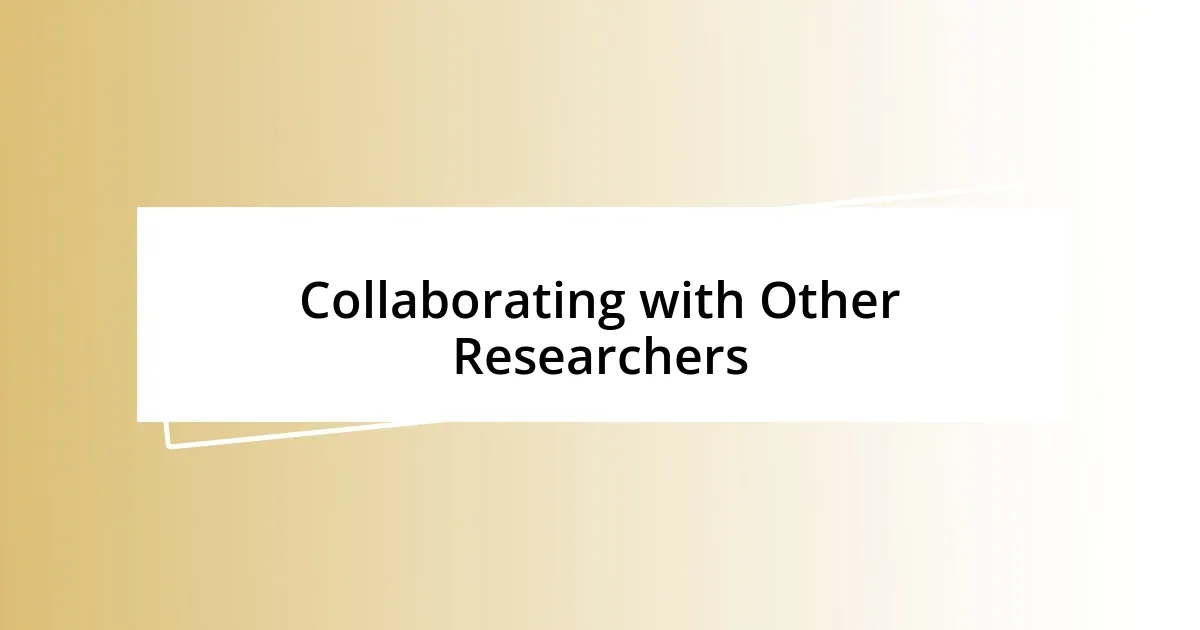
Collaborating with Other Researchers
Collaborating with other researchers has been a transformative aspect of my genealogy journey. I still remember my first online forum experience; I shared a brick wall I was facing with my great-great-grandfather. To my surprise, multiple people reached out with similar stories and even a few hints about possible records. It’s that sense of community that not only bolsters your research but also sparks new ideas. Have you ever felt the thrill of finding a teammate in your research? It can feel like a breath of fresh air when someone else brings a new perspective to your challenges.
Another valuable aspect of collaboration is sharing resources. Once, a fellow researcher I met at a local historical society offered to let me access some rare census documents they had saved. This experience taught me the beauty of reciprocity in research; when you share your findings, others are often inclined to reciprocate. Have you considered how pooling your resources might lead to unexpected discoveries? Trust me, the joy of finding a long-lost ancestor is even sweeter when you can celebrate it with someone who shares your passion.
I also appreciate how collaborating fosters a sense of accountability. Recently, I joined a genealogy study group where we share our goals and progress. Surprisingly, this has infused my research with motivation. When I set a goal to investigate my family’s immigration story, knowing that I’d discuss it next week with others kept me on track. Have you ever felt the weight of accountability work in your favor? It’s motivating to know that others are cheering you on while you embark on your own historical quests.
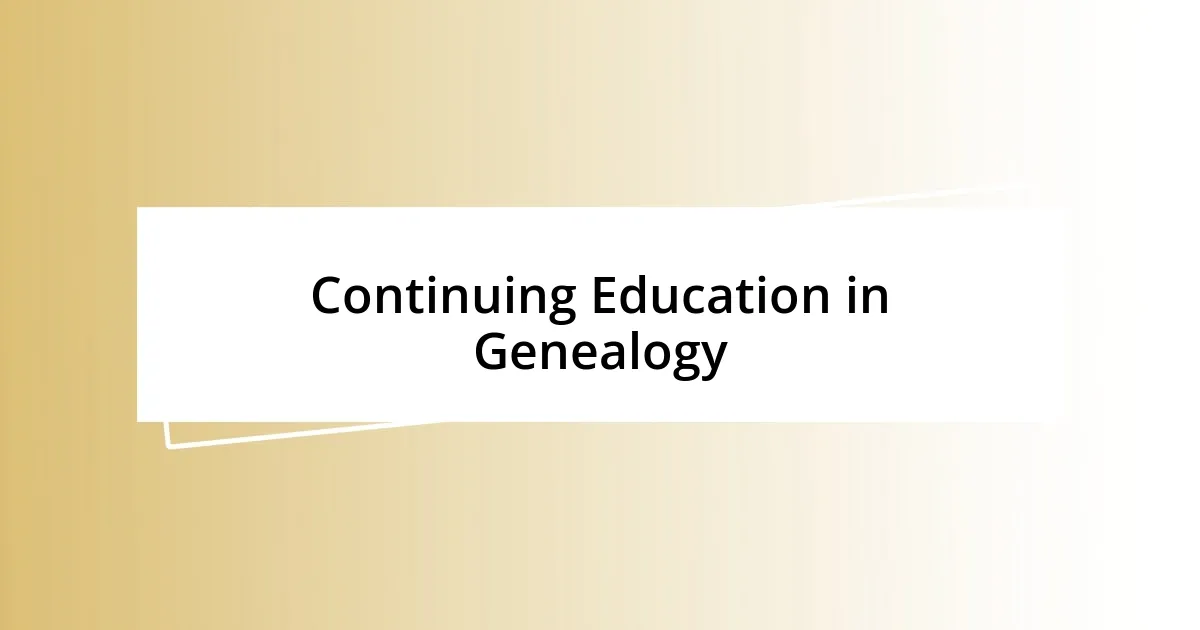
Continuing Education in Genealogy
Continuing education in genealogy has become an essential part of my research toolkit. I often find myself gravitating towards webinars or online courses that delve into specific aspects of genealogy research, like DNA analysis or historical context. Just last year, I took a workshop on using land records effectively, and it opened my eyes to a treasure trove of information I hadn’t considered before. Isn’t it interesting how a single session can reshape your entire approach to research?
Additionally, I’ve discovered that local genealogy societies offer invaluable resources and learning opportunities. When I attended a lecture on migration patterns, I was fascinated by how historical events influenced the movement of my ancestors. It sparked a whole new line of inquiry, prompting me to dive deeper into my family’s past. Have you thought about exploring what your local society has to offer? You might be surprised at the wealth of knowledge and support waiting right in your community.
Reading genealogy books and journals has also been a game-changer for me. I remember curling up with a book about oral histories and feeling the excitement as I learned techniques to capture my relatives’ stories. Those invaluable insights not only enhanced my research but strengthened my connections with family. Doesn’t the idea of preserving those stories for future generations excite you? There’s something profoundly satisfying about continuing to learn and apply that knowledge to your unique journey.





